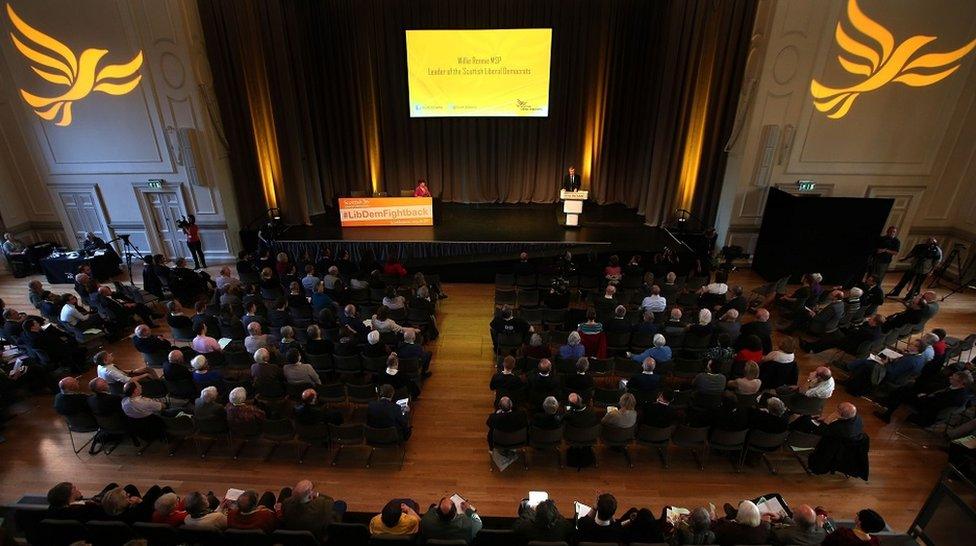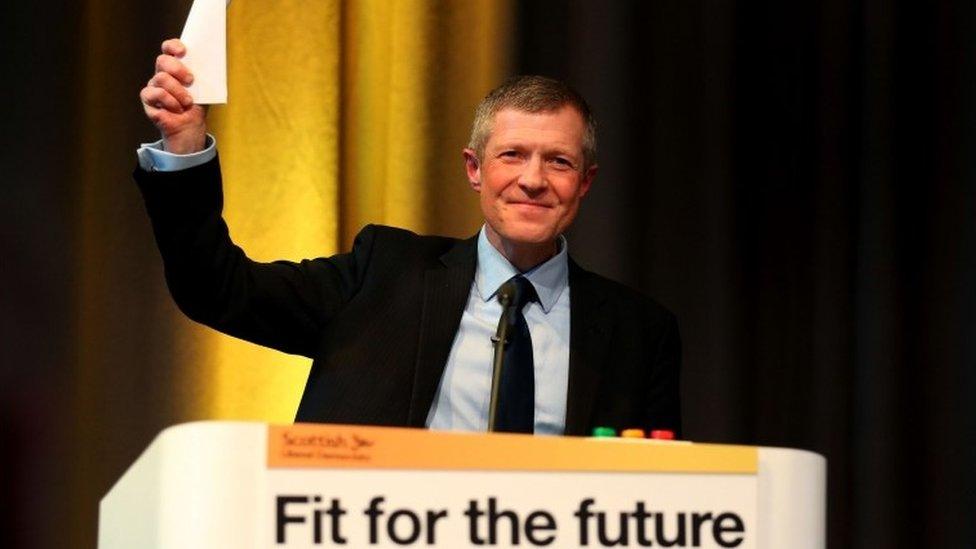Scottish Lib Dems conference: Bold debates and tricky votes
- Published

Willie Rennie spoke to delegates gathered at the Scottish Liberal Democrat conference
Party conferences can be tricky places for the unwary. Willie Rennie - he who steers the Scottish Liberal Democrats - is experiencing that phenomenon at his party's annual bash in Edinburgh.
There they were boldly debating the issue of fracking - or unconventional oil and gas extraction, to give it its Sunday name.
For every party, there is a need to study scientific and engineering data. But equally, for every party, there is another need - to think politically.
The Lib Dems are fighting in an electoral environment in Scotland where the incumbent party, the SNP, has announced a politically-driven moratorium on fracking.
Understanding the vote
The Lib Dems are also facing a challenge from the Greens who regard fracking with vitriolic contempt. Politics would seem to dictate that they ca' canny on fracking.
And yet they contrived in one of their first debates here to vote for an amendment which backs "lifting the moratorium on planning and licensing for unconventional oil and gas extraction".
Puzzled at this choice, politically, I sought advice from a party apparatchik. "I don't", I confessed, "understand that vote." The reply? "Join the club!"
Sundry explanations and caveats followed. The conference had not fully understood the somewhat complex motions and amendments. They had thought they were stressing the need to rely upon science.
Willie Rennie answered questions on his party's tax plan, the decriminalisation of drugs and Scotland's future in Europe
Further, my attention was drawn to the caveat that any future development would be "subject to robust regulation".
Further still, it was indicated that the policy might not necessarily feature in the manifesto for the Holyrood elections.
In which regard, one might seek clarity from a pre-manifesto document which is due to be published by the party tomorrow, here at conference. It has been suggested to me that policy on energy in that document may not exactly tally with the apparent verdict in the hall.
Still, these things. There was another intriguing vote - and I suspect this one will stick. The party agreed in general principle to overhaul its long-standing policy of a Local Income Tax (instead of Council Tax) and opted for a property or land tax instead.
That could be a reformed Council Tax or Land Value Taxation (although I doubt that, given the need to compile a full register) or some other version. Full details to be featured in the manifesto. Intriguing in that next week Scottish ministers will publish their thinking on the subject.
Then there was Willie Rennie's speech. Two broad themes, both very well received.
Firstly, a penny on income tax to devote to education. He detailed plans to spend part of the cash raised on a version of the Pupil Premium plan, already in place in England, whereby resources are allocated to schools to assist pupils from deprived backgrounds.
What else was in his speech?
Lib Dem candidates here at conference insist this is beginning to get a good reception on the doorsteps. They admit nobody likes paying tax - but believe the policy can gain traction if it can be guaranteed that the cash goes directly to local schools, not to local authorities.
Mr Rennie confirmed to me in a webcast interview that the policy could not be introduced before 2017 - because the 2016/17 tax rate has just been set by Holyrood. But he said, further, that the 1p levy across all rates would survive even after Holyrood gains the added power to vary changes in taxation between upper and lower rates.
Scottish Ministers have said no to an increase across the bands, arguing that it would be an unfair burden on those on lower incomes. A key battleground, of course, for the election.
Mr Rennie's second theme? An attempt to equate the SNP with the Conservatives. He described them indeed as "two peas in a pod".
Given that they take diametrically different positions on the constitution and much else besides, how could such a claim be justified? Mr Rennie argued that they both wanted to obsess about independence - albeit from different sides - and that they propped each other up with competing scare stories.
Is it just possible that Mr Rennie fears his party will be squeezed out of the debate - and possibly electoral support - from such a posited dichotomy? Dear reader, I think it might well be so.
- Published26 February 2016
